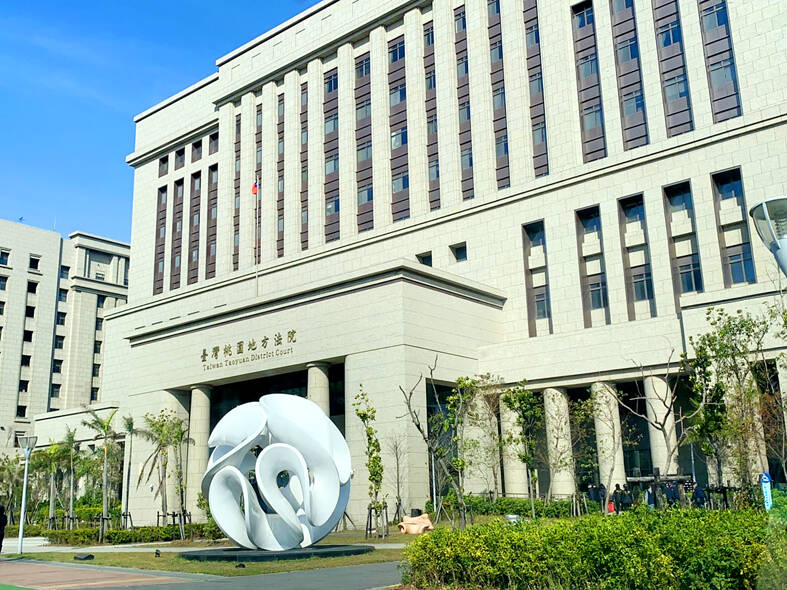A former deputy chief of news desk at the Military News Agency, was on Wednesday sentenced to five years and six months in prison for espionage and attempting to recruit fellow officers to spy for China.
Lieutenant colonel Kung Fan-chia (孔繁嘉), 54, was convicted of violating the National Security Act (國家安全法) and of breaching his “official duties” by demanding or accepting bribes or other improper benefits in contravention of the Criminal Code, as the Military News Agency is a state media outlet managed by the Ministry of National Defense.
The Taoyuan District Court also ordered that the US$117,000 and 60,000 yuan (US$8.267) Kung received from his Chinese handlers be confiscated.

Photo: Chou Min-hung, Taipei Times
The ruling can be appealed.
Judicial investigators found that Kung in 2006 met with Chinese intelligence officials based in Xiamen City in China’s Fujian Province and agreed to spy for the Beijing government.
Kung thereafter sought fellow military officers to form a spy network to access confidential materials and reports on Taiwan’s armed forces.
He tried to recruit fellow officers, including those working at the Military News Agency, by offering rewards and promises of all-expense paid trips to Southeast Asian countries, where they met with Chinese officials who would entice them with monetary rewards to spy for China, investigators said.
In the ruling, the judges condemned Kung for “selling out his country” after being educated and trained by the Taiwanese military.
He “betrayed his official duties by accepting bribes for spying,” which had “brought dishonor to the military’s code of honor and state civil servants,” and had harmed the nation by secretly working for China to develop a spy network for more than 10 years,” the ruling said.
In a separate case, a Chinese woman surnamed Lin (林) was yesterday convicted of forgery of documents to obtain permanent resident status and sentenced to 14 months in prison, which can be commuted to a fine.
An investigation found that Lin had deceived local government agencies by using the identity papers of a friend — another Chinese woman surnamed Ou (歐), who was at the time married to a Taiwanese — to file for divorce, and forged other documents to gain permanent resident status to live and work in Taiwan.
After taking on Ou’s identity, Lin took 18 trips overseas between 2007 and 2018. The last time she applied to enter Taiwan in November 2022, she admitted to National Immigration Agency officers that she had used forged documents, leading to an investigation by public prosecutors in Kaohsiung.
In other developments, the Aviation Police Bureau yesterday charged a Chinese man surnamed Zhang (張), 55, of theft during flights to Taiwan this year.
Bureau investigators said that after receiving reports from air passengers of missing money and valuables from carry-on luggage, they checked video footage and saw Zhang, during flights from China and Southeast Asia to Taiwan, opening the overhead compartment on the pretense of taking out his things, but instead opening other people’s luggage to steal their belongings.
Bureau officials searched Zhang after a flight in April and found 16 different foreign currencies and valuable items belonging to other passengers.
Zhang was charged with aggravated theft by Taoyuan prosecutors.

Chinese Nationalist Party (KMT) Chairman Eric Chu (朱立倫), spokeswoman Yang Chih-yu (楊智伃) and Legislator Hsieh Lung-chieh (謝龍介) would be summoned by police for questioning for leading an illegal assembly on Thursday evening last week, Minister of the Interior Liu Shyh-fang (劉世芳) said today. The three KMT officials led an assembly outside the Taipei City Prosecutors’ Office, a restricted area where public assembly is not allowed, protesting the questioning of several KMT staff and searches of KMT headquarters and offices in a recall petition forgery case. Chu, Yang and Hsieh are all suspected of contravening the Assembly and Parade Act (集會遊行法) by holding

PRAISE: Japanese visitor Takashi Kubota said the Taiwanese temple architecture images showcased in the AI Art Gallery were the most impressive displays he saw Taiwan does not have an official pavilion at the World Expo in Osaka, Japan, because of its diplomatic predicament, but the government-backed Tech World pavilion is drawing interest with its unique recreations of works by Taiwanese artists. The pavilion features an artificial intelligence (AI)-based art gallery showcasing works of famous Taiwanese artists from the Japanese colonial period using innovative technologies. Among its main simulated displays are Eastern gouache paintings by Chen Chin (陳進), Lin Yu-shan (林玉山) and Kuo Hsueh-hu (郭雪湖), who were the three young Taiwanese painters selected for the East Asian Painting exhibition in 1927. Gouache is a water-based

Taiwan would welcome the return of Honduras as a diplomatic ally if its next president decides to make such a move, Minister of Foreign Affairs Lin Chia-lung (林佳龍) said yesterday. “Of course, we would welcome Honduras if they want to restore diplomatic ties with Taiwan after their elections,” Lin said at a meeting of the legislature’s Foreign Affairs and National Defense Committee, when asked to comment on statements made by two of the three Honduran presidential candidates during the presidential campaign in the Central American country. Taiwan is paying close attention to the region as a whole in the wake of a

OFF-TARGET: More than 30,000 participants were expected to take part in the Games next month, but only 6,550 foreign and 19,400 Taiwanese athletes have registered Taipei city councilors yesterday blasted the organizers of next month’s World Masters Games over sudden timetable and venue changes, which they said have caused thousands of participants to back out of the international sporting event, among other organizational issues. They also cited visa delays and political interference by China as reasons many foreign athletes are requesting refunds for the event, to be held from May 17 to 30. Jointly organized by the Taipei and New Taipei City governments, the games have been rocked by numerous controversies since preparations began in 2020. Taipei City Councilor Lin Yen-feng (林延鳳) said yesterday that new measures by